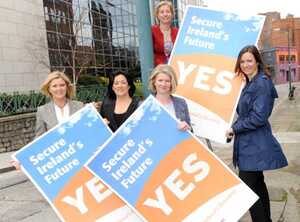The business lobby group Ibec has unveiled a poster campaign calling for a Yes vote in the fiscal treaty referendum in Dublin city centre this morning.
The posters say: "Secure Ireland's Future". Ibec director general Danny McCoy said he believed a No vote would increase the amount of time Ireland would spend in austerity and would hamper recovery, while a Yes vote would give confidence and certainty. "What Ireland needs now is growth," he said.
Mr McCoy said people making decisions about investment in Ireland were "a little bit bemused I suppose that we would be risking our access to
markets by even contemplating a No vote".
He said there was no need for scaremongering, but he believed a Yes vote would send a very positive signal.
Ibec president Julie O'Neill said a Yes vote would drive growth and recovery in the economy but a No vote would increase uncertainty
and increase the cost of servicing the State's debt.
"Driving Ireland's recovery is very important, and Europe is a very important part of that," Ms O'Neill said. "A No vote would be a dangerous step into the unknown that would leave Ireland on the sidelines of Europe and add to our economic difficulties."
Mr McCoy said people making decisions about investment in Ireland were "a little bit bemused I suppose that we would be risking our access to
markets by even contemplating a No vote".
He said there was no need for scaremongering, but he believed a Yes vote would send a very positive signal.
Ibec president Julie O'Neill said a Yes vote would drive growth and recovery in the economy but a No vote would increase uncertainty
and increase the cost of servicing the State's debt.
"Driving Ireland's recovery is very important, and Europe is a very important part of that," Ms O'Neill said. "A No vote would be a dangerous step into the unknown that would leave Ireland on the sidelines of Europe and add to our economic difficulties."

















